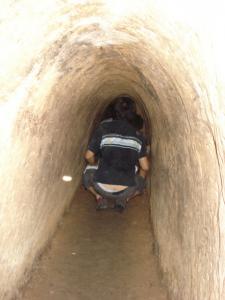Seven hours after leaving Sydney, I arrived in Ho Chi Minh City, for the second time in six weeks. As soon as I stepped out of the airport, I felt like I had never left. All the familiar feelings came back. It was then I realized the very things I had once hated, were those I missed the most.
I had disliked the smell in the air, the humidity, the constant noise of motorcyclists beeping their horns but most of all, the neverending trail of cab drivers, booksellers and accommodation touts approaching you in the street, all offering the best deals in town, especially for me, then offering the same deals to the next person in line.
On returning, however, the first motorcycle taxi driver brought a smile to my face. I remembered the warmth of the people, their effortless and natural interaction with one another and with travelers. Coming from London, this was refreshing. The Vietnamese don't seem hierarchical in their social etiquette. Crime is relatively low. Road rage isn't a problem – impressive since the road system is so manic.
A two-lane road separates two worlds in the accommodation district. On one side is a bustling tourist industry. Workers explain why their inn is the best and cheapest. Restaurant owners wave their menus to passers by, motorcycle taxi drivers whistle loudly and shout, “Where you go my friend, where you go”? Everyone struggles to be heard.
Across the road, in a small park, you find people practicing tai chi, or doing stretching exercises around a tiny lake. You often see elderly women up at six in the morning in their bedclothes performing their limbering moves in front of the water, slapping their legs to warm them up, oblivious to the busy tourist patch mere yards away.
Police presence is strong due to the fine line between respect and fear commanded from the local people. My only encounter was unpleasant, in fact, quite terrifying. I was staying in a cheap inn behind the main street. One morning, shouting from the lobby (one story down) woke me. I thought I would ask whoever was in charge to lower the noise level. As I walked down the stairs, a policeman came into view. He was leaning over the counter shouting at the owner. Then I saw two more standing over a worker who had squatted with his hands over his head. He was crying. Every so often he screamed when a metal baton hit him on the head.
Sensing this was not a situation I should be in, I turned to leave. The one who seemed to be in charge shouted at me in an aggressive tone, “You, where you from, how long you stay here”? I tried to collect my thoughts to answer, but he cut me off yelling, “Passport, bring me passport”. Relinquishing your passport in such a hostile environment is not something you want to do. What choice did I have? I was lucky. The policeman let me leave the building. I headed as far away as I could. When I later asked the owner what had happened, he casually sighed, "police".

 The largest of the tunnels
The largest of the tunnels
A half hour’s drive from the Cu Chi tunnels are the "handicapped handicrafts" workshop – a government project for people suffering from war related disabilities, mostly due to the effects of Agent Orange. These people are trained to make small items tourists might buy. Owing to the growing tourism industry, the project is self sufficient. The items are made using traditional Vietnamese art techniques, involving sticking small cut up pieces of eggshell to jewelry boxes, mirrors and other objects in a mosaic style. They are then painted. Even though this is beneficial for the disabled workers, I felt discomfort with the streams of tourists walking through the workshop, staring and taking photos.
I'm sad to leave. I felt relaxed and at home here. I'll return. Traveling takes you out of your comfort zone. It magnifies your experiences. Good ones become great; bad ones are horrible. That is why I travel.